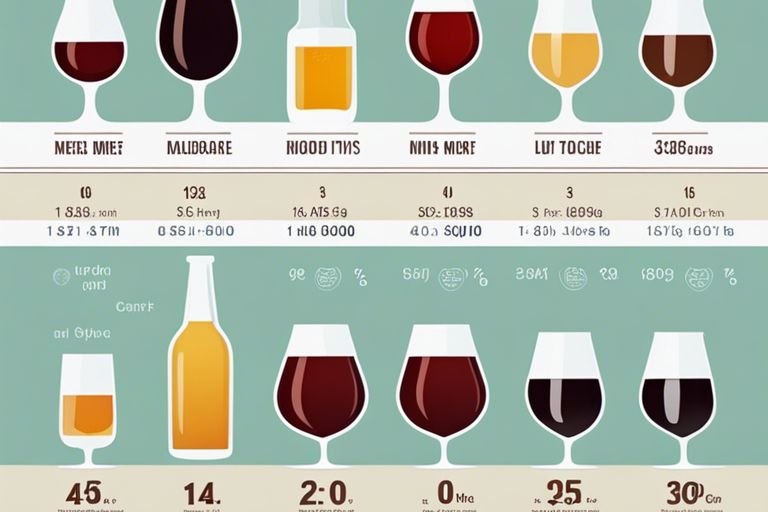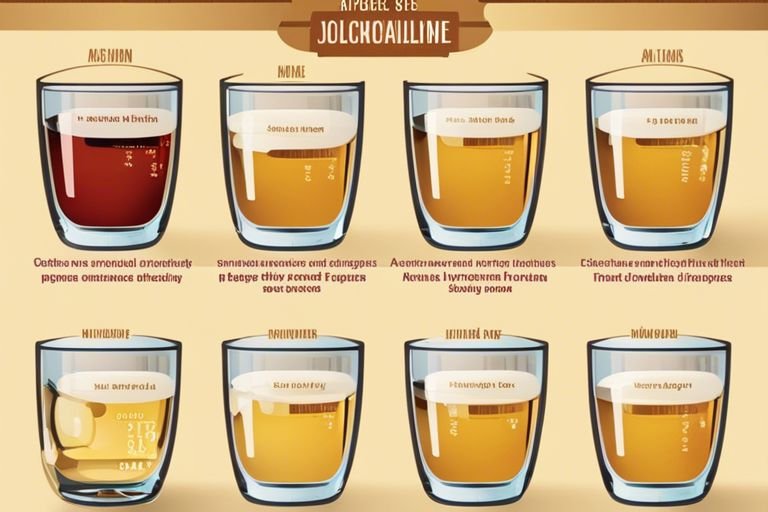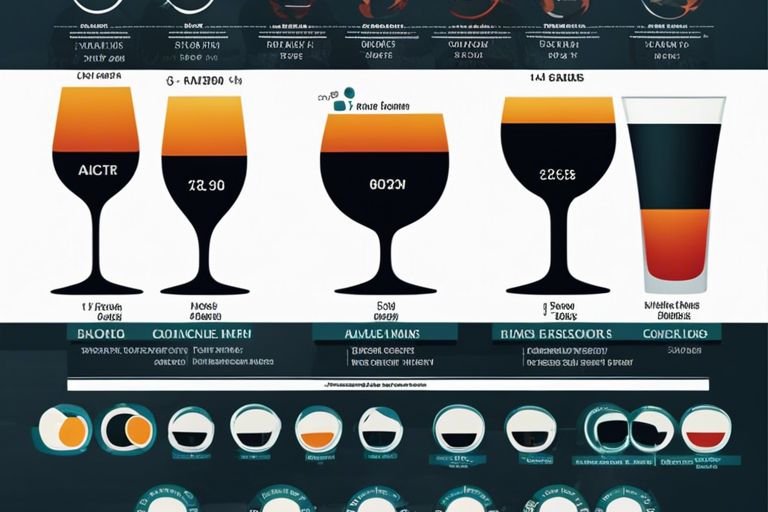As you raise a glass to celebrate a special occasion or unwind after a long day, you may wonder: how much alcohol can you safely drink in a week without compromising your health? The answer is not straightforward, but scientists are sounding the alarm about the potential risks of even moderate drinking. You’re likely aware that excessive drinking can lead to serious health problems, but did you know that even small amounts of alcohol can increase your risk of cancer, heart disease, and other conditions? In this article, we’ll research into the latest research to help you make informed choices about your drinking habits and uncover the truth about safe alcohol consumption.

The Risks of Excessive Drinking
Alcohol consumption can have severe consequences on your health, and it’s important to be aware of the risks associated with excessive drinking. While moderate drinking may be relatively low risk, exceeding the recommended limits can lead to a range of health problems.
The Link Between Alcohol and Cancer
Alarming research suggests that alcohol contributes to about half a dozen types of cancers, including breast and colorectal cancer. In fact, a new study found that alcohol is the third strongest risk factor for women, behind cigarettes and excess body weight, and the fourth strongest for men, after cigarettes, UV radiation, and excess weight.
Other Health Risks Associated with Drinking
To make matters worse, excessive drinking is also linked to heart and liver disease, among other conditions. The risks of developing these health problems increase significantly when you exceed the recommended limits.
Excessive drinking can damage your body in various ways. When you metabolize alcohol, your body breaks it down to acetaldehyde, a toxic chemical that can damage DNA and proteins. Additionally, alcohol generates chemically reactive molecules containing oxygen, which can damage proteins, fats, and DNA. It can also raise levels of the hormone estrogen, which is linked to breast cancer. The consequences of excessive drinking can be severe, and it’s crucial to be mindful of your alcohol consumption.
How Alcohol Affects Your Body
Any amount of alcohol you drink can have a significant impact on your body. When you consume alcohol, it is metabolized into acetaldehyde, a toxic chemical that can damage your DNA and proteins.
The Toxic Chemicals Produced by Metabolizing Alcohol
The process of breaking down alcohol in your body produces chemically reactive molecules containing oxygen, which can damage proteins, fats, and DNA. These toxic chemicals can lead to a range of health problems, including cancer and liver disease.
The Impact of Alcohol on Hormones and DNA
One of the ways alcohol affects your body is by raising levels of the hormone estrogen, which is linked to breast cancer. Drinking can also damage your DNA, increasing the risk of cancer and other health problems.
With alcohol consumption, the risk of cancer rises significantly, particularly for breast and colorectal cancer. In fact, studies have found that about 16% of female breast-cancer cases are linked to alcohol intake. By understanding how alcohol affects your body, you can make informed choices about your drinking habits and reduce your risk of developing these health problems.

Factors That Increase the Risks of Drinking
There’s no denying that drinking can be a fun and social activity, but it’s necessary to be aware of the factors that increase the risks associated with alcohol consumption. Understanding these factors can help you make informed decisions about your drinking habits and reduce your chances of developing health problems.
- Binge drinking: Consuming four to five or more drinks in one sitting can lead to injuries, accidents, and an increased risk of developing Type 2 diabetes.
- Differences in how men and women process alcohol: Women have lower levels of an enzyme that breaks down alcohol, making them more vulnerable to health harms above six drinks per week.
- Age: The older you get, the more susceptible you are to the negative effects of alcohol.
- Family history: If you have a family history of alcoholism or related health problems, you may be more at risk.
- Underlying health conditions: Certain health conditions, such as liver disease or pancreatitis, can increase the risks associated with drinking.
Perceiving the risks associated with drinking is crucial in maintaining optimal health. By being aware of these factors, you can take steps to reduce your risk and make healthier choices.
Binge Drinking and Its Consequences
Risks associated with binge drinking are severe and can lead to injuries, accidents, and even death. Binge drinking can also increase your likelihood of developing Type 2 diabetes, high blood pressure, and other health problems.
Differences in How Men and Women Process Alcohol
For women, the dangers of drinking too much loom especially large due to their lower levels of an enzyme that breaks down alcohol. Their bodies also contain less water and more fat, and they weigh less than men on average, making them more vulnerable to health harms above six drinks per week.
The differences in how men and women process alcohol are significant. Women are more susceptible to breast cancer, and their bodies are more prone to damage from alcohol due to their physiological makeup. Understanding these differences is necessary in making informed decisions about your drinking habits.
Strategies for Healthier Drinking
All of us know that drinking can be a part of social life, but it’s crucial to be mindful of our consumption to maintain optimal health. If you’re not ready to give up drinking entirely, there are ways to reduce the risks associated with alcohol consumption. Here are some strategies to help you drink more healthily:
Alternating Alcoholic and Non-Alcoholic Drinks
For a healthier drinking approach, try alternating between an alcoholic drink and a non-alcoholic one. This simple trick can slow down your alcohol intake and make you feel fuller, prompting you to drink less. Plus, it’s a great way to pace yourself and avoid overconsumption.
Eating Before and While Drinking to Slow Absorption
For a safer drinking experience, eat before and while you drink. Food can slow down the absorption of alcohol into your bloodstream, reducing its negative effects on your body. This is especially important if you’re planning to drink more than one serving.
Avoid drinking on an empty stomach, as this can lead to faster intoxication and increased health risks. Instead, opt for snacks or meals that are high in protein and healthy fats, which can help slow down alcohol absorption. By eating before and while drinking, you can reduce the risks associated with alcohol consumption and maintain a healthier lifestyle.
It’s also important to note that some people may be more prone to alcohol-related health issues, such as those who drink excessively or have a family history of addiction. If you’re concerned about your drinking habits or suspect that you might be a high-functioning alcoholic, it’s crucial to seek professional help and guidance.
Final Words
The key to maintaining optimal health while still enjoying a drink or two lies in moderation. You’ve learned that exceeding one drink a day can significantly increase your risk of cancer, heart disease, and other health problems. By limiting your weekly intake to two drinks or less, you can minimize these risks. Bear in mind, the only way to completely avoid related health issues is to stop drinking altogether, but for many, that’s not a realistic option. By being mindful of your consumption and making small changes to your habits, such as alternating between alcoholic and nonalcoholic drinks, you can enjoy a healthier relationship with alcohol.
